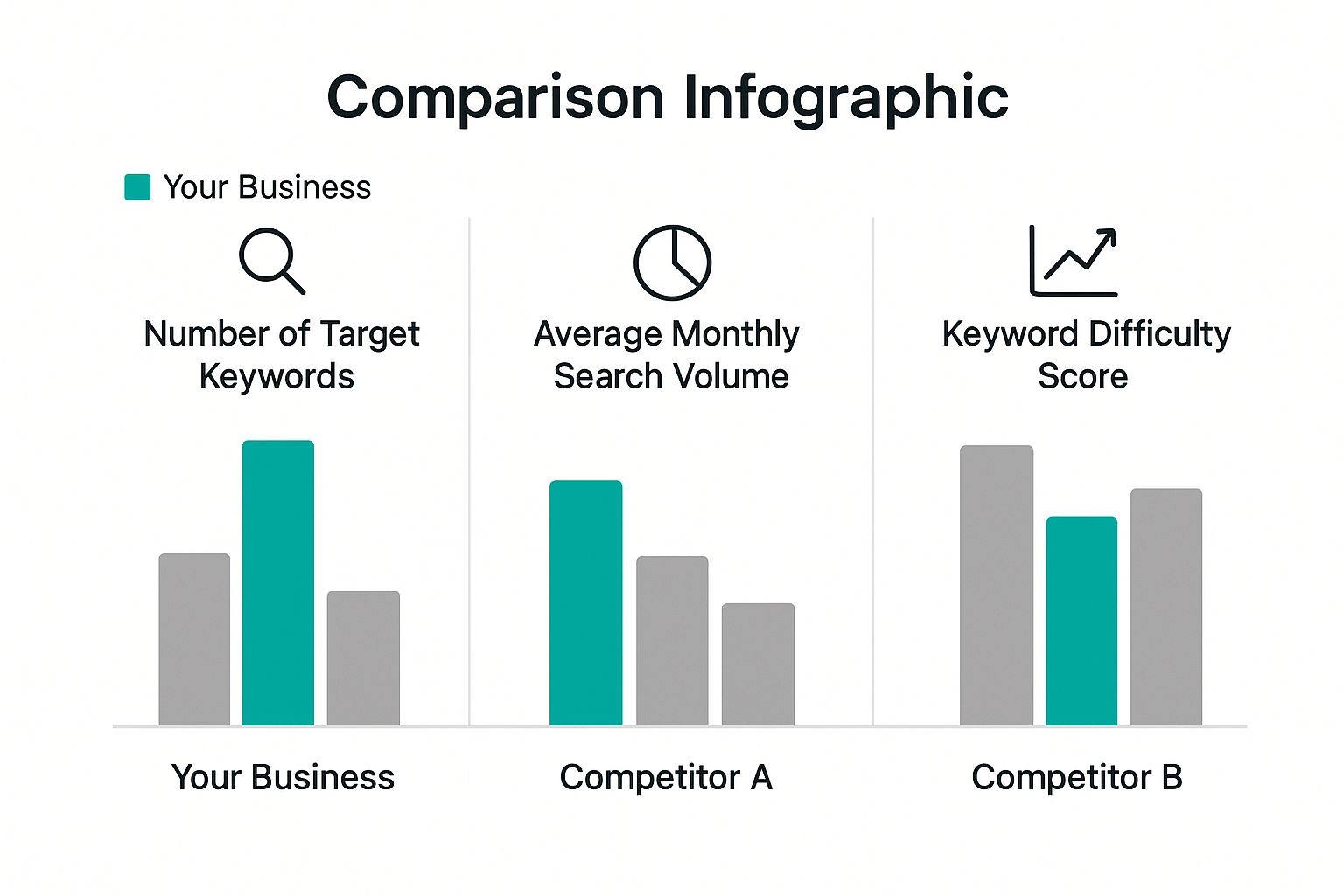
Alright, let's get into the heart of keyword research. Forget the techy jargon for a second. At its core, this is all about figuring out the exact words and phrases your potential customers are typing into Google when they need something you offer.
It’s less about being an SEO wizard and more about becoming an expert in your customer's language. Get this right, and you’ve laid the foundation for everything else—getting found online and turning those searchers into actual customers.
Why Keyword Research Is Your Small Business's Secret Weapon

Look, I get it. As a small business owner, you're juggling a million things. The last thing you need is another hat to wear, especially one that says "SEO Expert."
But what if you thought about keyword research differently? What if it wasn't a chore, but your best source of business intelligence? Because that's exactly what it is. The keywords you find are direct clues into what your customers want, what they're struggling with, and how they think.
Stop Guessing, Start Knowing
Without solid keyword research, you’re essentially marketing in the dark. You might think you know what your customers are searching for, but the data often tells a different story.
I once worked with a bespoke furniture maker who was pouring all their effort into ranking for "handcrafted wooden tables." It sounds right, doesn't it? But their local customers were actually searching for "custom dining tables for small spaces." That tiny shift in phrasing was everything. Good keyword research shines a light on these crucial differences.
It gives you a data-driven roadmap. You’ll know exactly what to write about on your blog, how to phrase your service pages, and what to highlight in your product descriptions. You stop shouting into the void and start having real conversations with people who are already looking for you.
"Keyword research determines who your competitors are and which area of the search landscape you can rank for. Doing keyword research and understanding where your blog or website sweet spot is—that’s what gives you rankability."
This process isn't just about traffic; it's about your bottom line. When your website speaks the same language as your customers, you attract people who are far more likely to buy.
Connecting Keywords to Your Business Goals
It's easy to see keywords as just a "marketing thing," but they're directly tied to your core business objectives. Whether you want more foot traffic, a bigger email list, or to be seen as the go-to expert in your town, the right keywords pave the way.
This table breaks down how a smart keyword strategy directly fuels your business growth.
| Your Business Goal | How Keyword Research Helps Achieve It | What Success Looks Like |
|---|---|---|
| Increase Foot Traffic | Target local keywords like "bakery near me" or "plumber in Austin." | More customers walking through your door and a higher ranking in Google Maps. |
| Generate More Leads | Find "problem-aware" keywords to create helpful guides or free tools. | A growing email list filled with potential customers who trust your expertise. |
| Boost Online Sales | Focus on "buying intent" keywords like "buy black running shoes size 10." | Higher conversion rates on your product pages and an increase in online revenue. |
| Build Brand Authority | Answer common industry questions with in-depth blog posts. | You become the go-to source people link to and share, building trust and recognition. |
See the connection? It’s a direct line from what people search for to the results you see in your bank account.
Win Over Local Customers Who Are Ready to Buy
For most small businesses, the local market is everything. And this is where keyword research truly shines. When you zero in on location-specific terms ("best pizza in Brooklyn" or "emergency plumber near me"), you’re getting in front of an audience that is fired up and ready to act.
The link between a local search and a sale is incredibly direct. An eye-opening 46% of all Google searches have local intent. Even better, a whopping 78% of local searches on a mobile device lead to an offline purchase within 24 hours. Getting your business into Google’s Local Pack (that map box at the top of the search results) can be a complete game-changer, and it all starts with targeting the right local keywords.
Want to dive deeper into the numbers? You can explore more small business SEO statistics to see the full picture.
Ultimately, mastering this skill empowers you to:
- Build real authority. When you consistently answer your customers’ specific questions, they start to see you as the expert.
- Drive the right kind of traffic. You’ll attract people who are actively looking for the solutions you offer, not just random visitors.
- Improve your offerings. Keyword data can reveal gaps in the market or common frustrations your customers have, giving you ideas for new products or services.
It’s the engine that powers a sustainable, customer-first growth strategy, helping you compete and win, no matter how big your competitors are.
Brainstorming Seed Keywords Your Customers Actually Use
https://www.youtube.com/embed/FzEkHlYt2uA
Alright, this is where the fun really starts. Forget about fancy software for a minute—the best keyword research begins with some good old-fashioned brainstorming. The very first thing we need to do is come up with a list of seed keywords.
Think of these as the main ingredients for your entire SEO recipe. They're the broad, foundational terms, usually just one or two words, that describe what you sell. You won't necessarily try to rank for these simple terms, but they're the critical starting point for discovering hundreds of more specific, high-value keywords later on.
Think Like Your Customer, Not an Expert
This is probably the biggest mistake I see small businesses make. They get caught up in industry jargon that their actual customers would never dream of searching for. You might be proud of your "bespoke integrated marketing solutions," but your customer is just typing "help marketing my small business" into Google.
The trick is to step outside your own brain and put yourself in your customer’s shoes. What words would they use to describe their problem? What everyday language comes to mind when they need what you offer?
Here are a few simple ways to get the ball rolling:
- List What You Sell: Seriously, write down every single product or service. Don’t just say "plumbing." Get specific: "emergency pipe repair," "leaky faucet fix," "drain unclogging."
- Frame the Problem: For each service, think about the problem it solves for the customer. For "drain unclogging," the customer's problem is a "clogged kitchen sink" or "shower not draining."
- Talk to Your Frontline Team: Your sales and customer service folks are a goldmine. Ask them what exact words and phrases customers use when they call or email. This is as real as it gets.
Put on Your Detective Hat
Some of the best keyword ideas are hiding in plain sight. You just need to know where to look. Your own customers and your direct competitors are speaking the language you need to learn.
Mine Your Own Reviews and Testimonials Scour your Google Business Profile, Yelp page, and any testimonials on your site. What specific phrases do your happiest customers use over and over? If you run a local coffee shop, you might see people mentioning "best espresso downtown" or "quiet place to work." Boom. Those are seed keywords.
Listen to Your Sales Calls If you record customer calls (for training or quality), go back and listen to a few. Pay close attention to how a new prospect describes their issue before you've had a chance to pitch them. They use raw, unfiltered language that is pure keyword gold.
A key insight here is that customers almost always describe the symptom, not the solution. You might be thinking about "holistic pet nutrition," but your customer is searching for "my dog won't stop scratching" or "healthy food for picky cat." You have to capture the symptom.
Spy on Your Competitors (The Ethical Way)
Looking at your competitors isn't about ripping them off. It's about understanding what language is already resonating with customers in your space. Just pull up the websites of your top 3-5 competitors.
Here's what to look for:
- Their Page Titles and Headings: What words are they using in the biggest text on their main pages?
- Their Website Navigation: How do they label their main menu items? Is it "Our Services," "What We Do," or something more descriptive like "Residential & Commercial Painting"?
- Their Page URLs: The words in the URL (like
competitor.com/emergency-roof-repair) are often the exact keywords they're targeting.
After running through these exercises, you should have a solid starting list of 5-10 core seed keywords. This list is the foundation for everything else you'll do. This initial legwork is what makes the difference between a generic list of terms and a smart, customer-centric SEO strategy.
For a deeper dive, our complete guide on how to do keyword research builds on these foundational steps with more advanced tactics.
Uncovering Hidden Gems with Free Keyword Tools
Alright, you've got your starting list of seed keywords. Now for the fun part: turning that handful of ideas into a treasure map of real opportunities. A lot of small business owners think you need to shell out for expensive subscriptions to do proper keyword research, but that's a myth. Honestly, some of the most powerful tools out there won't cost you a dime.
This is where we roll up our sleeves. Think of it as a hands-on workshop. We're going to take your core concepts and uncover the exact phrases actual customers are plugging into Google to find businesses just like yours. You don't need a big budget for this, just a little time and a smart approach.

Going Straight to the Source with Google Keyword Planner
First things first, let's talk about the big one: Google Keyword Planner. Since the data comes directly from Google itself, you can trust it's a solid starting point. It’s built for advertisers, but you can absolutely use it for your organic SEO strategy without ever spending money on ads. All you need is a Google account.
Once you’re in, head over to the "Discover new keywords" feature and pop in one of your seed keywords. Let's imagine you run a local bakery. A simple seed keyword like "custom cakes" can suddenly unlock a whole list of more specific, high-intent phrases people are searching for right now.
You might find gems like:
- "birthday cakes for kids near me"
- "vegan wedding cake bakery"
- "gluten free custom cakes price"
See how much more detailed those are? We call these long-tail keywords, and for a small business, they are pure gold. They tell you exactly what a potential customer wants, making it so much easier for you to create a webpage or blog post that speaks directly to them.
Any small business trying to get found online needs to be using free keyword tools—it's non-negotiable. Tools like Google Keyword Planner, AnswerThePublic, and Ubersuggest offer incredible insights at no cost. But because its data comes straight from the horse's mouth, Google Keyword Planner is the most essential tool in the box, especially when your budget is tight. You can find a complete breakdown of the best free keyword research tools for small businesses if you want to explore more options.
The screenshot above gives you a peek inside Keyword Planner, showing you the monthly search volume ranges and competition levels. This data is your first quick check to see which keywords are worth chasing and which ones might be a bit too crowded for a new business to tackle.
Finding the Questions Your Customers Are Asking
Next up is a wonderfully creative tool I love called AnswerThePublic. Instead of just spitting out a boring list of keywords, it visualizes search queries in a "search cloud." You give it a seed keyword, and it gives you back hundreds of questions, prepositions, and comparisons that people are actually using.
Let's say your seed keyword is "dog training." AnswerThePublic will show you what’s on people’s minds:
- Questions: How much does dog training cost? When should I start puppy training?
- Prepositions: Dog training for aggressive dogs. Dog training without treats.
- Comparisons: Dog training vs self-taught. Group classes vs private trainer.
Every single one of these is a fantastic idea for a blog post, an FAQ page, or even a social media video. When you create content that directly answers these questions, you immediately position yourself as the helpful expert. You'll attract people who are deep in the research phase and looking for answers you can provide. It's like having a direct line into your customer's brain.
Spotting Trends and Seasonal Interest
Another fantastic freebie from Google is Google Trends. This tool is a bit different; it won't give you exact search numbers, but it shows you the relative popularity of a search term over time. This is perfect for understanding seasonal demand and jumping on rising trends.
For example, a landscaping company could use it to compare interest in "lawn aeration" versus "fall cleanup." They would almost certainly see a huge spike for aeration in the spring and another for cleanup in the autumn. That's powerful data! It helps you plan your content and promotions to hit when your customers are most actively looking.
It's also great for settling internal debates. Let's say you're a fitness coach torn between creating content around "kettlebell workout" or "HIIT workout." A quick check on Google Trends can show you which term is hotter right now or has a stronger upward trend in your city. It’s a simple, brilliant way to make data-driven decisions without getting buried in spreadsheets. This is an essential gut-check in any good keyword research for small business strategy.
Choosing Keywords That Actually Bring You Customers
Alright, so you've got a massive spreadsheet full of keywords. That's a great starting point, but it's really just raw data. The real magic in keyword research for small business happens now, when you learn how to separate the gold from the gravel. It’s time to turn that list into a smart, actionable strategy that brings you actual, paying customers.
This is all about understanding the story behind the search. We need to look past the words themselves and get a feel for a few key metrics. These numbers tell us which keywords are truly worth your valuable time and effort. Getting this right is the difference between attracting random browsers and connecting with eager buyers.
Decoding the Metrics That Matter
When you pull up your keyword list in a tool like Google Keyword Planner or Ahrefs, you’ll see a few columns of data next to each term. At first glance, it can feel a bit intimidating, but these metrics are pretty straightforward once you know what to look for.
To make it simple, let's break down the three big ones you need to understand.
Decoding Keyword Metrics for Smart Decisions
A simple guide to understanding the three core keyword metrics so you can choose with confidence.
| The Metric | What It Really Means | Why It Matters to Your Small Business |
|---|---|---|
| Search Volume (MSV) | The estimated number of times people type this keyword into Google each month. | This shows potential traffic. High volume is nice, but it almost always means high competition. Don't get blinded by big numbers. |
| Keyword Difficulty (KD) | A score (usually 0-100) that predicts how hard it'll be to rank on page one of Google for that keyword. | As a small business, you want to find terms with lower KD scores. This is your secret weapon to get seen without a massive budget. |
| Search Intent | This is the why behind the search. Is someone looking to learn, compare options, or buy something right now? | This is the most crucial metric. Get this wrong, and you'll attract the wrong audience, leading to high bounce rates and no sales. |
Focusing on these three metrics will keep you from making the most common mistake: chasing keywords with massive search volume. Sure, a term like "marketing" might get millions of searches, but it’s impossibly competitive and the intent is way too broad. You’re much better off finding a sweet spot.
This image gives you a quick visual of how your strategy might stack up against competitors.

You can see that even though Competitor A is targeting keywords with bigger search volumes, the difficulty is also sky-high. That's a tough, expensive battle to fight.
The Power of Search Intent
This is it. If you master one thing, let it be search intent. I can't stress this enough. If you misjudge why someone is searching, your content will never connect, no matter how perfectly you optimize it. You’ll get clicks, sure, but people will hit the back button in seconds because you didn't give them what they wanted.
Let’s make this real. Imagine you're a local plumber. Here's how intent changes everything:
- Informational Intent: Someone searches for "how to fix a leaky faucet." They want a DIY guide. Your play? A helpful "How-To" blog post or a quick video tutorial.
- Commercial Intent: The search is "best plumber reviews springfield." They're close to hiring but are doing their homework. This is where you need a strong testimonials page and a solid collection of Google reviews.
- Transactional Intent: You see a search for "emergency plumber near me." This person has a burst pipe and needs help right now. Your service page and Google Business Profile need to be perfectly optimized for this exact term.
See how that works? You have to match your content to their need. You wouldn't try to hard-sell your services on a "how-to" blog post, and you definitely wouldn't write a history of plumbing for someone with a flooded basement.
The goal isn't just to rank; it's to provide the right answer at the right time. When you nail the search intent, you’re not just an SEO—you’re a problem-solver. This builds trust and turns searchers into clients.
Finding Your Low-Hanging Fruit
For a small business, the fastest path to real results is targeting "low-hanging fruit." These are the keywords that hit the sweet spot: they have decent search volume, lower keyword difficulty, and a clear commercial or transactional intent.
Often, these are long-tail keywords—longer, more specific phrases of three or more words. While a broad term like "landscaping" is a beast to rank for, a long-tail keyword like "drought resistant garden design austin" is a goldmine. The search volume is lower, but the person searching for it is a highly qualified lead who is likely ready to make a decision.
As you go through your list, start sorting keywords into buckets based on their intent. I always tell clients to prioritize creating content for their transactional and commercial keywords first, since those are closest to the sale. For more advanced tips on this, our guide on how to find profitable keywords digs even deeper into spotting these high-value terms.
This strategic approach makes sure your efforts are focused where they’ll have the biggest impact on your bottom line. It's how you build momentum and get tangible wins, fast.
Alright, you've done the legwork. You’ve got a spreadsheet that’s probably overflowing with great keywords, all neatly sorted. So, what’s next? This is where the magic happens—where all that research turns into an actual strategy that can grow your business. Frankly, that list of terms is just data until you put it to work on your website.
The goal here isn't to cram keywords into every nook and cranny. That’s an old-school tactic that makes you sound like a robot and can actually get you in trouble with Google. Instead, think of it like weaving them into a natural conversation. We want to build pages that are genuinely helpful for people first, and perfectly clear for search engines second.
Let's walk through a real-world scenario to make this concrete. Imagine you run a local plumbing business and you've pinpointed "emergency drain cleaning service" as a golden keyword—it’s high-intent and likely to bring in customers. Here's how you'd take that one phrase and build a killer, customer-focused page around it.
The Prime Real Estate for Your Keywords
Think of your webpage like a piece of property. Certain spots are just more valuable and get more attention from search engines. When you place your most important keywords in these prime locations, you're basically putting up a big, bright sign for Google that says, "Hey, this is what this page is all about!"
Here are the on-page SEO spots you absolutely need to nail:
- Page Title (or Title Tag): This is the blue, clickable link people see in the Google search results. It's arguably the most critical spot for your keyword. A good one grabs attention, includes the keyword, and makes someone want to click.
- Headings (H1, H2, H3): Your H1 is your main page headline—your primary keyword has to be here. Your H2s and H3s break up the page and are perfect for related terms and variations.
- URL: The page's web address needs to be clean, easy to read, and include the keyword. Something like
yoursite.com/emergency-drain-cleaningis miles better thanyoursite.com/service-ID-8675309. - The First 100 Words: Getting your main keyword in near the top of your page just feels natural. It reassures visitors they’re in the right place and reinforces the topic for search engines.
- Image Alt Text: This is the description you give your images. It’s a huge help for accessibility and gives Google another clue about your page's content.
Let's Build a Page: The Plumber Example
Okay, let's get our hands dirty and build out that page for our plumber targeting "emergency drain cleaning service."
Page Title: Emergency Drain Cleaning Service | Fast 24/7 Response | [Your City]
This title is perfect. It leads with the main keyword, throws in a powerful benefit ("Fast 24/7 Response"), and adds a local hook, which is a must-have for any small business.
H1 (Main Headline): Need an Emergency Drain Cleaning Service? We’re Here 24/7.
See what we did there? The H1 has the exact keyword but frames it as a question that speaks directly to a visitor's immediate problem.
URL: yourplumbingbiz.com/emergency-drain-cleaning-service
Clean, descriptive, and has the keyword. Chef's kiss.
Now for the rest of the page. You wouldn't just keep repeating "emergency drain cleaning service." That sounds unnatural. Instead, you'll use related terms and answer the questions people are actually asking.
H2 Subheading: Our Fast Drain Unclogging Process
This H2 uses a close variation—"drain unclogging." Under this heading, you could walk them through your process, naturally using terms like "blocked pipes," "slow drain," and "hydro-jetting."
Another H2 Subheading: Common Signs You Need an Emergency Plumber
This heading targets people who know they have a problem but aren't sure how bad it is. The content below could list symptoms like "gurgling noises," "foul odors from drains," or "water backing up in sinks." Guess what? Each of those is a potential long-tail keyword you’re now targeting.
The real secret is to always think about the user. Someone searching for an emergency service is stressed. They need fast answers, not a wall of text. Your page should give them quick solutions, obvious calls-to-action ("Call Us Now!"), and reasons to trust you, like customer reviews. The keywords are there to support that goal, not to be the goal itself.
When you focus on the user experience first, you'll find that you naturally create a page that's rich with all the right language. The result is a page that doesn't just rank—it actually brings in business. As you get more comfortable, diving deeper into keyword research best practices will help you master all these little on-page details. This kind of thoughtful approach is how your research turns into real, tangible growth.
Your Keyword Research Questions Answered

Even with the best plan, you're bound to hit a few snags once you start digging into keywords. It happens to everyone. Let's walk through some of the most common questions that pop up, so you can feel confident in the choices you're making.
Getting this stuff right is what separates a one-off effort from a real, repeatable process. This is how keyword research for your small business becomes a genuine part of your growth engine, not just another task on the to-do list.
How Often Should I Do Keyword Research?
Honestly, thinking of keyword research as a single project you finish is a mistake. It’s more like an ongoing conversation you're having with your audience. You can't just "set it and forget it."
I recommend breaking it down into a few layers:
- Once a year: Do a big, deep-dive review. This is your chance to zoom out and make sure your entire SEO strategy still aligns with your business goals for the next 12 months.
- For every new piece of content: You should be doing fresh, targeted research for every blog post or service page you create. This is what keeps your content sharp and effective.
- Quarterly check-in: It's also smart to pop into a tool like Google Trends every few months. See what's new in your industry. If a new product or trend is gaining steam, you’ll want to do some fresh research to get ahead of the curve.
The big takeaway here is that keyword research is a living thing. Your market changes, your customers' problems evolve, and your strategy needs to adapt right along with them. Staying curious is your best tool.
Should I Focus on High Search Volume or Relevance?
This one comes up all the time, but for a small business, the answer is simple: relevance wins, every single time.
Chasing a keyword with 10,000 monthly searches is tempting, but it’s completely pointless if it doesn't match what you actually offer. Those are just vanity metrics. You’ll get a flood of traffic from people who aren't your customers, they’ll hit your site, realize you can’t help them, and bounce immediately.
It is so much smarter to target a specific, long-tail keyword that only gets 50 searches a month, as long as those 50 people are your exact ideal customers. For small businesses, this is the fast track to real, profitable growth. You attract qualified traffic that actually turns into leads and sales.
Is It a Good Idea to Just Copy My Competitors' Keywords?
Looking at your competitors' keywords is a brilliant intelligence-gathering move. You absolutely should do it. But blindly copying them? That's a huge strategic error. Think of their strategy as inspiration, not a blueprint.
The real goal is to see what's working for them and then find the gaps—the angles they've completely missed. This is how you carve out your own spot in the market instead of just fighting them for the same crowded terms.
Let me give you a real-world example:
- Your big competitor ranks for: "personal training services" (very broad and competitive)
- You could target: "personal training for busy parents" or "at-home personal training programs for beginners"
See the difference? You’re not trying to beat them at their own game. You're creating a new game you can actually win. This approach lets you connect with a specific audience that your bigger, more generic competitors are probably ignoring. It’s a smarter way to build authority and find customers who feel like you’re speaking directly to them.
Feeling overwhelmed by spreadsheets and guesswork? RankHub takes the manual labor out of keyword research. Our AI-powered platform analyzes your entire website in under 60 seconds to deliver a prioritized list of keyword opportunities your competitors are missing. Stop guessing and start ranking. Get your tailored keyword strategy today at https://www.rankhub.ai.
More from Our Blog
7 Killer Content Strategy Example Ideas to Copy in 2025
Looking for a proven content strategy example? We break down 7 real-world strategies from HubSpot, Red Bull & more to inspire your own plan.
Read more →
Analyze Keyword Competition Like a Pro
Tired of guessing? Learn how to analyze keyword competition with our practical guide. We cover the tools, metrics, and workflows to find winnable keywords.
Read more →
Ecommerce Content Strategy for Ecommerce | Win More Sales
Master your content strategy for ecommerce to boost traffic, engage customers, and increase sales. Learn proven tactics to grow your online store.
Read more →